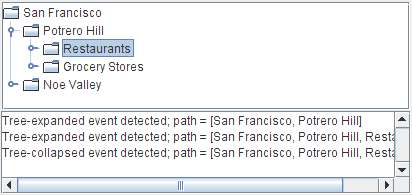How to Write a Tree Expansion Listener
Sometimes when using a tree, you might need to react when a branch becomes expanded or collapsed. For example, you might need to load or save data.
Two kinds of listeners report expansion and collapse occurrences: tree expansion listeners and tree-will-expand listeners. This page discusses tree expansion listeners. See How to Write a Tree-Will-Expand Listener for a description of Tree-Will-Expand listeners.
A tree expansion listener detects when an expansion or collapse has already occured. In general, you should implement a tree expansion listener unless you need to prevent an expansion or collapse from ocurring .
This example demonstrates a simple tree expansion listener. The text area at the bottom of the window displays a message every time a tree expansion event occurs. It's a straightforward, simple demo. To see a more interesting version that can veto expansions, see How to Write a Tree-Will-Expand Listener.

Try this:
-
Click the Launch button to run TreeExpandEventDemo using
Java™ Web Start (download JDK 6).
Alternatively, to compile and run the example yourself,
consult the
example index.

- Expand a node. A tree-expanded event is fired.
- Collapse the node. A tree-collapsed event is fired.
The following code shows how the program handles expansion events.
You can find the source code for this example in
TreeExpandEventDemo.java.
public class TreeExpandEventDemo ... {
...
void saySomething(String eventDescription, TreeExpansionEvent e) {
textArea.append(eventDescription + "; "
+ "path = " + e.getPath()
+ newline);
}
class DemoArea ... implements TreeExpansionListener {
...
public DemoArea() {
...
tree.addTreeExpansionListener(this);
...
}
...
// Required by TreeExpansionListener interface.
public void treeExpanded(TreeExpansionEvent e) {
saySomething("Tree-expanded event detected", e);
}
// Required by TreeExpansionListener interface.
public void treeCollapsed(TreeExpansionEvent e) {
saySomething("Tree-collapsed event detected", e);
}
}
}
The Tree Expansion Listener API
The TreeExpansionListener Interface
TreeExpansionListener has no adapter class.
| Method | Purpose |
|---|---|
| treeCollapsed(TreeExpansionEvent) | Called just after a tree node collapses. |
| treeExpanded(TreeExpansionEvent) | Called just after a tree node expands. |
| Method | Purpose |
|---|---|
| Object getSource() | Return the object that fired the event. |
| TreePath getPath() | Returns a
TreePath object that identifies each node from the root of the tree
to the collapsed/expanded node, inclusive.
|
Examples that Use Tree Expansion Listeners
The following table lists the examples that use tree expansion listeners.
| Example | Where Described | Notes |
|---|---|---|
TreeExpandEventDemo
|
This section | Displays a message whenever a tree expansion event occurs. |
TreeExpandEventDemo2
|
How to Write a Tree-Will-Expand Listener | Adds a tree-will-expand listener to TreeExpandEventDemo.
|
